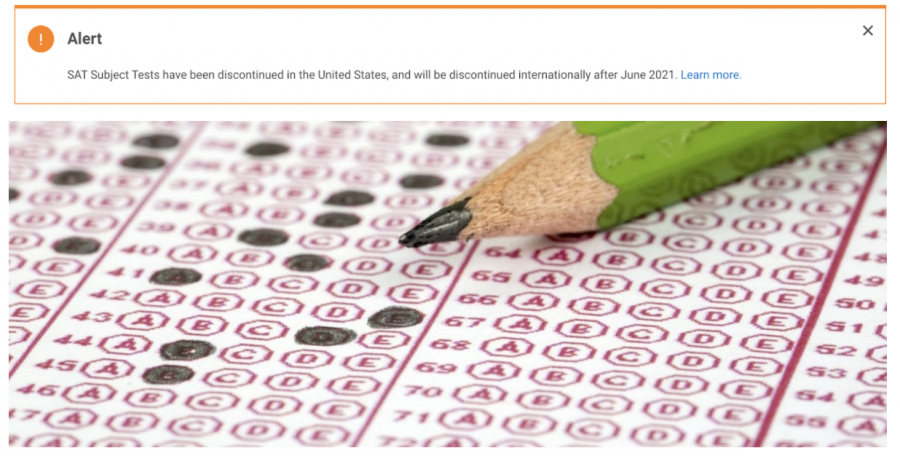Why Cancelling the SAT Subject Tests Was a Good Idea
On January 19, College Board canceled SAT Subject Tests in the United States. The tests will be discontinued internationally after June 2021.
On Jan. 19, College Board canceled SAT Subject Tests. These were standardized multiple-choice tests that could be taken in specific subjects such as Math or History, in order to improve a student’s qualifications for college. Many colleges, especially Ivy League and top 20 schools, recommend SAT Subject Tests in subjects such as math or science for specific majors. The registration fee for the SAT subject exams is $26, making it more affordable than AP exams, which cost $93. Ultimately, College Board’s decision to cancel the SAT Subject Tests, despite their cheaper costs, is beneficial for students, as it reduces the number of standardized tests students will have to take throughout high school.
First of all, the Subject Tests are becoming less and less relevant within the college admissions process. Most students are only advised to take the tests if they are confident in their knowledge of the subject and to only submit the score if it is high enough, usually 700 or higher. The irrelevance of the Subject Tests could likely stem from the tests’ poor design. According to the Harvard Crimson, Subject Tests test extremely specific areas of broad subjects, which makes it more likely for students to simply memorize the information rather than learn it.
A majority of the College Board’s decisions are also financially motivated, and when incentives for taking Subject Tests began to decrease, it would have been unwise for College Board to continue allocating resources to the tests. This is likely the reason the organization decided to cancel Subject Tests in the first place, as they were actively losing money from the lack of enrollment even before the pandemic. Once COVID-19 hit, registration rates plunged, instigating College Board’s decision to discontinue the test.
Furthermore, in order to understand a large amount of the subject being covered, it is useful to take a specialized class, such as an AP class. This effectively renders subject tests redundant due to the existence of AP tests. This separate testing makes it harder for low-income students, who wind up paying the fees for two tests instead of one. These fees can range from around $120 to around $150 in total, and it is ultimately a waste of money to have to repeat what is essentially the same exam. Not to mention the cost of test prep, which can include prep books and tutors, driving the cost of both exams and putting more financial strain on low-income students and their families. College Board also states that the wide reach of AP courses and tests to low-income students and students of color deem the subject tests unnecessary.
For cost-efficiency, many self-study for both AP classes and Subject Tests, as they cover similar topics. But the process of self-studying is difficult and time-consuming, and it is more worthwhile to self-study for the AP Test, which tests a broader range of subjects.
Some may argue that canceling the subject tests puts more emphasis on AP classes, which, despite College Board’s claim, still are not accessible to many disadvantaged students. Supposedly, the elimination of subject tests puts more pressure on students to take AP classes in high school and to score well on the AP tests, a much more difficult task for low-income students. However, the elimination of subject tests will put more pressure on schools to offer AP classes and hopefully make them more widespread. Moreover, there are also many free/low-cost AP resources, and College Board is working to improve equality for AP tests. On their website, College Board offers daily video lessons from AP teachers, provided topic questions that pertain to each class lesson, personal progress checks, and a progress dashboard. It is much harder to find similar resources for the subject tests.
Due to the Subject Tests’ irrelevance, it can be said that this new change will not have much of an effect on students overall, with the necessity of the SAT and AP exams. However, while the elimination of Subject Tests will not reduce stress on students entirely, it will give students one less thing to worry about in the hectic high school environment. Additionally, AP classes, which will hopefully become more widely used, give students college credits while subject tests don’t, making them a more valuable educational investment.
The College Board’s decision to cancel SAT Subject Tests ultimately benefits everyone involved, as it reduces some of the stress on students, prevents College Board from losing money, and will hopefully provide more students with access to AP classes.







